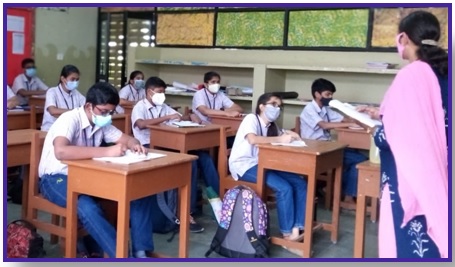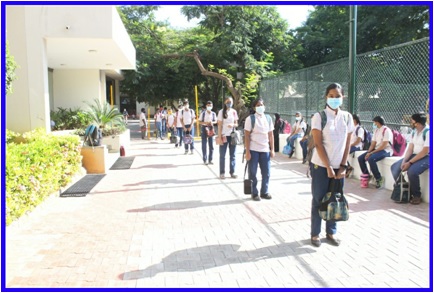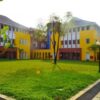Students’ Corner: Hera Lalan, Jain Vidyalaya, Madurai
As children from the age group of 15-18 start getting their first vaccination doses, they feel more safer and interested to begin physical schooling. Amidst the steep rise in fresh cases of Covid 19, many students and teachers are against the idea of shutting down schools completely. Whereas governments of states like West Bengal, Maharashtra, Haryana, Chhattisgarh, Delhi, Karnataka have closed down schools, many students and teachers’ group alike are not in sync with this idea.
“There are times when we do love the idea of schooling from the comfort zones of our homes, but mostly we enjoy the experience of physical schooling or offline schools,” says Hera Lalan, a standard XII student and the head girl from Jain Vidyalaya, Madurai. A student from the Humanities stream, Lalan prefers to go out of the box and enrol herself in one of the country’s design schools after her school examination. An alternative to this, she also has plans to pursue criminology with Psychology and Law as one of the major subjects.
In an all-new series titled Students’ Corner, which puts special emphasis on children and their views, EducationWorld interviews Lalan just after she received her first dose of vaccination against the deadly Covid 19.
Q. Presently, is your school conducting offline classes?
We are having offline classes for standard 10, 11 and 12. For the junior classes, they are having the new normal mode of online classes.
Q. What is the general preference amongst students?
We have already started getting our vaccination doses. All those who have the consent from their parents, are getting vaccinated. Once jabbed, it is definitely safer for students to come down to school. Change is the only constant in this millennial and one must change their old ideologies of a complete offline schooling. Hands on experiments should always be given a preference to be carried out physically. See, there has to be a balance between the both. Experts say that Covid 19 is here to stay with us. Either it is the old variant or else it mutates itself to Omicron and affects us. But then life has to move on and hence certain changes must be brought into the education system so that we may continue “schooling” amidst all adversities. But definitely, shutting down schools is not an option.
Q. The Students council representative is one of the most coveted positions in schools. How are/were you carrying out your responsibilities online and amidst the virtual classes? How different was it compared to the pre-covid times?
Since the pandemic began, we have been actively conducting meetings online. The Council, United Jain Vidyalaya Action League or UJVAL, has been reporting any and all issues, and successfully resolving them. We, along with our Principal have also been planning to launch multiple exciting student clubs in the near future! There hasn’t been much of a change in our process compared to Pre-Covid times, except that we now don’t have to worry about schedules, since everything can be done online. We were equally active then as we are now.

Q. Going by reports, even after re-opening not many students are attending in-person classes. What has the response been in your school?
There has been an excellent turnout for in-person classes, with there being full attendance almost every day. In fact, while conversing with my peers, I found out that we were all eager to come back to school!
Q. Since there has been little time for revision of the previous year’s syllabus and the pandemic has caused disruptions in continued education, how do you think the learning gap can be bridged?
My personal Mantra would be self-learning. Knowledge would truly seep in only if the self is motivated. But additionally, a simultaneous comparison on how the previous year’s syllabus connects with that of the current year, that is, establishing a link between the two would be an effective way to revise without losing too much time. To achieve this, students, teachers and parents need to take a few steps towards each other. One such step would be to devote an hour after school to bridge the aforementioned gap.
Q. According to you, what is more viable at this stage? Is it returning to physical classes or a continuation of the online ones?
While we have all adapted quickly to online education, I don’t think physical classes will easily be replaced, or at least not very soon. The pros of physical education easily outweigh those of online education. The major deciding factor would be interaction. The physical presence of your teachers and peers is like a motor, which subconsciously runs your learning process. Additionally, we would not be sitting around like couch potatoes the whole day, instead have some physical exercise at least.
Q. How were your practical classes (lab sessions) managed during the pandemic?
Simple experiments in which can use the materials at home were done during the online sessions with the teacher’s guidance. We used Olab (a virtual lab) to get the real lab experiences, in which we tried out experiments with chemicals and other scientific instruments.
Q. How did you make up for the missing peer interaction? Have you managed to stay connected with your friends?
Well, since returning to in-person classes, we have been limited interaction with other classes to breaks, which is of course for our safety. So undeniably we made the most of that little time, as anyone would. We’ve celebrated birthdays, in small groups once it was safer too. We’ve definitely lost time, but are trying to make up for it as and when we can!

Q. There have been last-minute changes in exam patterns, evaluation criteria, etc. How have you dealt with this?
While the changes in the exam pattern were sudden, I was able to receive the news positively, because the division of the papers into MCQs for the first term and Subjective answers for the second has allowed my focus to be in one area at a time.
Q. What does the government need to do to support children during the pandemic as classes have gone online?
To make certain facilities like a stable Internet connection and a compatible device be available, by collaborating with ISPs and device dealers to provide special subsidised options for students, which will lessen the burden.
The government can also contact content creators to revise the syllabus, and make it visually appealing, hence making it easier to teach and learn.
Q. Now that schools are reopening in a phased manner, are you apprehensive or eager to join school back? What is your parents’ take on the issue?
I’m very eager to return to school, meet my teachers and my old and some new friends too! My parents wanted me out of the house when they heard this news! I’d been cooped up inside the house for too long.
Q. In the absence of in-person interaction with teachers, how do you keep abreast with the latest career options or higher education prospects available to you currently?
Personally I have been able to connect with various resources online to keep myself updated about Liberal education, and other career options.
Q. How did you cope with exam stress? Did you have access to a counsellor who could help you through difficult times?
I had the full trust and support of my parents and teachers, along with a concrete study plan. The exam stress did not get to me so easily.
Q. As per the CBSE new pattern for Class 12 the exam will be held twice a year with a reduced syllabus, one exam for each term. What is your take on this?
This was a good decision on CBSE‘s part. The reduced portion allows us to delve deeper into the lessons, and explore every nook and corner of them.
Q. How are you preparing for competitive exams? Are you attending post-school tutorials?
I am preparing for multiple competitive exams this year. I have been able to get multiple study materials, apart from the classes I attend outside of school hours. I’m using my time apart from schoolwork promptly, because I feel that one year of extra work will ensure you a good education and hence, a good life.
Q. Have you understood the National Education Policy 2020’s takeaways? What is your take on it.
The NEP 2020 will allow students to choose a combination of any subject, discarding the current stream system. The implementation of this policy will take India one step further, since youth is the key to a new and developed nation.
Also Read: Online education can be substitute, not mainstream: Parth Khullar, Amity International School, Saket


















Add comment